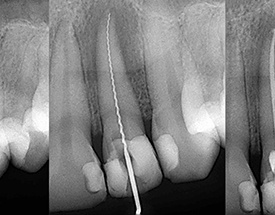
Root Canal Therapy in Cumming
 Dr. Brian and Dr. Katherine offer comfortable root canal therapy and all-ceramic crowns to restore decaying teeth. Modern root canal therapy is a simple procedure with a high success rate. All-ceramic crowns eliminate old-style metal containing crowns for beautiful durability.
Dr. Brian and Dr. Katherine offer comfortable root canal therapy and all-ceramic crowns to restore decaying teeth. Modern root canal therapy is a simple procedure with a high success rate. All-ceramic crowns eliminate old-style metal containing crowns for beautiful durability.
Root canal therapy and crowns are familiar dental procedures. Advances in modern restorative dentistry gives these treatments for failing teeth a new reputation, and especially so when Brian Y. Lee, DDS, MADIA, FICOI and Katherine J. Lee DMD,MPH, MADA, FICOI perform them.
What is a “root canal?”

Root canal therapy is a dental procedure with a long history. Previously thought of as a last-ditch, agonizing and lengthy procedure, modern “root canals” treat injured, decayed and infected teeth, restoring them to full function for years to come. Also used prophylactically for teeth that are not sick but have had numerous procedures, root canal therapy is a comfortable treatment that takes about an hour with one follow-up appointment.
How Root Canals Work

The Cumming, Ga dentist drills a small hole in the tooth to access the one to 4 inner chambers or canals. These root canals contain the tooth’s blood supply, nerves and connective tissue--structures important when a tooth is developing, but not essential during the adult life of the tooth. Often, when a patient experiences a toothache, it is this interior pulp that is infected and causing discomfort and other symptoms of abscess such as swelling and difficulty chewing.
After drilling the hole, the dentist uses tiny metal files to clean out the infected pulp and debris from the canals. He or she flushes the chambers with water and may instill an antibiotic solution to quell the infection. Then, the canals are sealed with an elastic substance called gutta-percha. A temporary filling covers the tooth until the next dental appointment when a crown is placed to finish the restoration.
The entire root canal procedure takes about an hour and usually requires no more than local anesthesia. The tooth should be treated gently for a few days, and patient take over the counter ibuprofen or acetaminophen for discomfort. Ideally, the follow-up appointment finishes the procedure, and with diligent dental hygiene and exams, the restored tooth lasts for years.
Root Canal FAQ

It’s normal to be nervous before root canal therapy, but don’t worry! Dr. Brian and Dr. Katherine will help you stay as comfortable as possible during the procedure and will advise you on making the recovery process easier. Here are some common questions about root canal therapy; feel free to contact us if you have any of your own!
Are Root Canals Painful?
Did you know that many patients have said that getting root canal therapy is no worse than getting a filling? Despite the procedure’s reputation, it’s not particularly painful – especially when compared to the tooth pain leading up to it! We’ll numb the area around the tooth to help keep you at ease. (There are some cases where this isn’t even necessary, but we can still use anesthesia if you feel like you need it to relax.) There will be some discomfort in the days following the surgery. It’s usually very mild and can be reduced with ibuprofen, naproxen or other over-the-counter pain medications.
Is Root Canal Better Than an Extraction?
Some patients might think it’s easier to just have the tooth removed rather than get a root canal, but it’s always better to take the option that lets you save all of your natural teeth. If there’s a gap in your smile, the remaining teeth could shift out of place and create painful bite problems; your jawbone will start to deteriorate as well. You can get a dental implant or another type of restoration as a replacement, but it will come with its own cost. Thus, it’s usually healthier and more cost-effective to save your tooth whenever possible.
Does Dental Insurance Cover Root Canals?
If you have dental insurance, it’ll usually help pay for root canal therapy. Some plans will cover 50% of the cost, but others can go as high as 90%. Of course, this might depend on you meeting a deductible first. Review your policy so that you’re aware of exactly what’s covered and what the limitations are. We’ll be happy to file your claim for you and make sure that you’re receiving maximum benefits. Patients who don’t have insurance can ask about other payment options, such as interest-free financing through CareCredit.
What Will Happen If I Choose Not to Have a Root Canal?
An infected tooth won’t heal on its own. Although the pain will eventually go away, that’s because the nerves have been destroyed. The infection will still be there and, if it’s left alone, could potentially spread to other parts of the body, including the brain and the bloodstream. After a certain point, if the tooth becomes damaged beyond the point of saving, there won’t be any choice but to extract it in order to protect your overall health. To avoid these long-term complications, it’s best to have a root canal performed as early as possible once you know you need one.